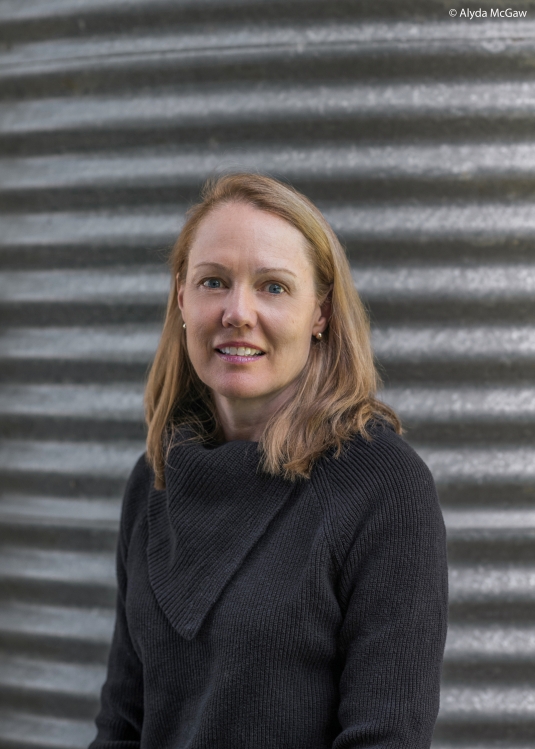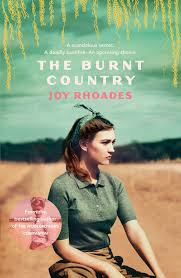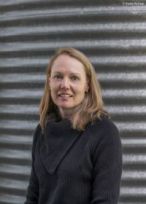
Welcome to Tea with Mrs B, an author interview series. Here to share a pot of tea and to chat about her brand new book, The Burnt Country, is Joy Rhoades.

Joy Rhoades was born in Roma in western Queensland, with an early memory of flat country and a broad sky. Growing up, she loved two things best: reading and the bush, whether playing in creek beds and paddocks, or climbing a tree to sit with a book. Her family would visit her grandmother, a fifth generation grazier and a gentle teller of stories of her life on her family’s sheep farm.
At 13, Joy left Roma for Brisbane, first for school and then to study law at university. After graduating, she worked all over: first Sydney, then London, Hong Kong, Singapore, Tokyo and New York. It was in New York that she completed a Masters in Creative Writing at the New School University, and wrote much of The Woolgrower’s Companion, a novel inspired in part by snippets of her grandmother’s life and times.
She now lives in London with her husband and their two young children, but she misses the Australian sky.
Hello Joy. It is my pleasure to warmly welcome you to my blog, Mrs B’s Book Reviews. Thank you for joining me for Tea with Mrs B, an author interview series. To set the mood for our tea infused interview, what is your preferred beverage, tea, coffee or other? And side accompaniment, scone, cake or other?
Thanks so much, Mrs B, for having me. But no coffee, thank you, as I drink far too much when I’m working/ writing! I do love tea, especially as it’s usually reserved for sharing a pot with a friend over a chat. English breakfast tea is my favourite, with a bit of milk. To munch on? I love scones but hardly ever make them. My mum can run up a batch in no time so they wonderfully remind me of her.
Can you tell us what genres you write for and how many books you have had published?
I’ve written two novels, both published by Penguin. My second, The Burnt Country is published on 6 August 2019. Both are historical fiction, set in the 1940s in northern NSW.
The Burnt Country is your latest release, can you describe it in just a sentence?
One woman’s fight to clear her name after a catastrophic bush fire, with a love story along the way.
What came first in the creation of the novel – the title, plot, characters or setting when you first set out to write The Burnt Country?
The Burnt Country stands alone but can be read after my first novel, The Woolgrower’s Companion. The novels share a setting —the Longhope district in northern NSW— and a main character, Kate Dowd, a young woman trying to run a large sheep station.
How long did it take you to write The Burnt Country?
It took about eight months to write The Burnt Country and I’d spent some months before that on research.
How different was the experience of writing The Burnt Country, compared to your previous novel, The Woolgrower’s Companion?
Hah! Writing my first novel took a long time. I was working as a lawyer during the day, and my girls were small, so any writing had to be sneaked in around work at home and work at work. But I’m writing full-time now and so it’s been such a joy (sorry, not sorry) to write The Burnt Country. I can’t describe the pleasure I get from writing. That remarkable Hungarian-American psychologist Mihaly Csikszentmihalyi was the first to describe flow – the state when you’re doing so engrossed in what you’re doing that for you, time stops. That’s what it’s like for me to write.
Can you tell us about the research process to bring The Burnt Country to life? How did you incorporate this research into the narrative?
I always start by reading widely, taking notes and hoping for one spark, then many sparks, quirks in history that are little known. As I go along, I build an outline of the novel. Then I take that and talk to experts to make sure my arc is believable. On The Burnt Country I got guidance from many sources: from firefighters, historians, vets, a sheep expert, so many wonderful kind people who helped me shape an authentic story. I’m most grateful though, for to the guidance I received on Aboriginal aspects. Elder and academic Aunty Judi Wickes advised me and shared her research into her own family’s history. And the late Aunty Kerry Reed-Gilbert, poet, activist, and writer, advised me on my debut novel, The Woolgrower’s Companion, as well as on this book The Burnt Country. It breaks my heart that Aunty Kerry, who taught me more than I can ever say, recently passed away. She was a remarkable woman. She changed the way I look at the world. Her unflinching memoir, The Cherry Picker’s Daughter is out in September and it’s a book every Australian should read.
Can you tell us more about the main themes of your novel?
I read somewhere that a writer never really knows the themes of a novel until after it’s written. I think that’s fair enough. I hope The Burnt Country covers a lot of ground, burnt and unburnt, including a woman’s resilience and having the strength of your convictions. But it’s duty that’s at the heart of the novel: the duty you owe to those who depend on you and also, whether you owe a duty to yourself.
Where did the inspiration for your characters come from?
Mainly from my grandmother. A fifth generation grazier, she loved history, especially family history, and she was a great story teller in her own way. She spent much of her 102 years on a sheep place in northern NSW.
Can you tell us more about the setting of your novel?
The New England tableland is beautiful country, and was so exotic to me, coming from Roma in western Queensland. With its good rainfall, creeks that ran and rolling hills with granite outcrops, New England seemed a million miles away from the western plains around Roma.
What ingredients do you feel are necessary to compose a successful historical fiction narrative?
I think the history can’t show. By that, I mean, good histfic has to be accurate but the reader shouldn’t feel they’re getting a history lesson. Instead, hopefully the reader’s experience is of a great story that happens to be set in the past.
What do you hope readers will take away from reading The Burnt Country?
I consciously avoid aiming to send any kind of message through my writing. What I do hope for is that a reader will be gripped from first page to last.
How did you make the transition to a published author?
I was very lucky. After I finished my first novel, I found my agent fairly quickly. And there was a lot of publisher interest in that first manuscript, The Woolgrower’s Companion. Wonderfully, it went on to be a debut bestseller.
Can you tell us about your creative working space, where do you write and is there anything vital you need to get started?
I often write at the kitchen table early in the morning when the place is quiet. Our cat and dog keep me company. I try hard not to judge what I’m writing, just get a first draft down. The real work is in the editing, I tell myself. And for me that’s true.
Is there a genre you haven’t tried writing yet, but want to in the future?
I’d like to meld a contemporary story with a historical one. I’ve got an outline like that, that’s taking shape now, in fact.
What is the best part of being a published author?
Doing something you love. Reaching readers, touching readers with your stories. That’s a wonderful feeling.
If you could slip back in time, what era would you travel to and why?
I’d like to be in the USA on the day that Neil Armstrong first walked on the moon. The feeling of discovery would be remarkable to experience. And I’d like to go back to Australia just before white settlement. It’s hard for me to imagine that glorious landscape untouched by Europeans.
What is next on the horizon for Joy Rhoades? Do you have any writing projects you would like to share with us?
I’m working on a new book, historical fiction again and set in the early 1950s. A mystery of sorts, it follows two women, one starting out into adulthood, the other closer to the end of her life. Set in Sydney, with episodes in France and London, it also touches on post war trauma in all its forms: from soldiers’ PTSD to the shock for women as so many freedoms won during the war — work outside the home, for example— were lost when their men returned.
What 2019 book releases are you most excited to read?
Louisa Treger’s new novel, The Dragon Lady, is out now and I can’t wait to read it. It sounds like I’d love it: a huge backdrop of the African skies, a mystery about a woman and the tattoo that starts at her ankle.
Finally, wrapping up our tea themed interview, who would you most like to share a pot of tea with?
Almost any woman of power I’d love to talk to, to hear about their journey. So in politics: Angela Merkel, Indira Ghandhi, Jacinda Ardern. And writer! Ursula Le Guin, Gloria Steinham, Judith Wright, Melissa Lucashenko.
Thank you for taking the time to visit Mrs B’s Book Reviews for Tea with Mrs B Joy. Congratulations on the publication of The Burnt Country!
A scandalous secret. A deadly fire. An agonizing choice.
Australia 1948. As a young woman running Amiens, a sizeable sheep station in New South Wales, Kate Dowd knows she’s expected to fail. And her grazier neighbour is doing his best to ensure she does, attacking her method of burning off to repel a bushfire.
But fire risk is just one of her problems. Kate cannot lose Amiens, or give in to her estranged husband Jack’s demands to sell: the farm is her livelihood and the only protection she can offer her half-sister Pearl, as the Aborigines Welfare Board threatens to take her away.
Ostracised by the local community for even acknowledging Pearl, Kate cannot risk another scandal. Which means turning her back on her wartime lover, Luca Canali …
Then Jack drops a bombshell. He wants a divorce. He’ll protect what’s left of Kate’s reputation, and keep Luca out of it – but for an extortionate price.
Soon Kate is putting out fires on all fronts to save her farm, keep her family together and protect the man she loves. Then a catastrophic real fire threatens everything . . .
The Burnt Country by Joy Rhoades was published on 6th August 2019 by Penguin Books Australia. Details on how to purchase the book can be found here.
 Connect with Joy here:
Connect with Joy here:
Website


